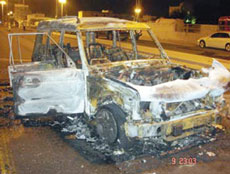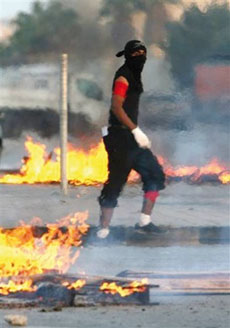
|
 |
 |
|
|
|
|
|
|
|
|
|
|
|
|
|
|
|
|
|
|
|
|
|
|
Bahrain: Inciting Violence and its Impacts
|
 |
| The jeep in which the security man burned to death |
Regardless of the reasons behind the current political and social violence, these incidents are generally unjustifiable and unacceptable, especially in a country that has an open political atmosphere and a political process in which the vast majority of the people are participating. This article discusses inciting violence which many political parties and human rights activists are believed to be involved in. An example of this is the speech of Abdulhadi Al Khawaja, former president of Bahrain Human Rights Centre, on the occasion of Ashura in January 2009.
This kind of incitement has mostly been imported, and is not only responsible for political and security tensions in the country, but most importantly, is also responsible for the human rights violations that have occurred. This is because it provides a suitable environment for breeding violence and is one of the main obstacles facing the natural development of civil human rights institutions. It is notable that some extremely politicized parties and individuals have established offices under the pretext of defending human rights, but at the same time use a purely political rhetoric. It is also clear that political incitement has attracted local human rights institutions in a strange kind of alliance, as it is unusual for advocates of violence to form alliances with human rights defenders, who should defend the principles of justice.
The objectives and the language used for inciting violence will be addressed here. Although it is not possible to go into the details, it is sufficient to point out some of the main points based on the example of one particular public statement. This statement, which contains subversive and violent content, was issued by the London-based Bahrain Freedom Movement (Harakat Ahrar al-Bahrain) under the title ‘Thank You: Youth of Molotov’. The statement was issued on 12 April 2009, after the royal pardon of 178 detainees involved in clashes and riots. Generally, the title is stunning and self explanatory. However, we have the following remarks about the statement:
1) The incitement is directed at the youth in particular, as they are adventurous and less mature. The statement praises them as follows: ‘you are a source of pride, dignity and freedom. You have taught us many lessons and proved that the regime is as weak as a spider’s web...you are heroes etc’. As much as these youths are exploited as tools of the incitement, they are also its victims.
2) The statement contains a truly ugly description of the enemy, whether a ruler or a competing body. Descriptions of the enemy that contained in the statement include: ‘cruel’, ‘corrupt’, ‘torturers, killers, invaders, occupiers, tyrants’. Such a description renders confronting the enemy not only desirable, but also a duty, as those who embody these attributes should undoubtedly be opposed despite all difficulties. The statement promises people that victory can be achieved by removing the regime: ‘your heroism has broken the enemy and a dedicated few are able to weaken the regime and overturn it’. The statement continued: ‘those who perpetrate crimes against humanity, especially the main tyrant and his ministers and torturers’ have been exposed ‘and you have paved the way for international trials of the regime, just like the Nazis after World War Two. The Nuremburg trials will be repeated with the help of Allah’.
3) The incitement in the statement is direct; otherwise it would lose its effect on the youth. The amount of verbal incitement and praise for violence is shocking such as: ‘thank you to the youth of cylinders and burning tires ... without you, newspapers and news agencies would not have been alerted to the injustice facing our people. Never give in to the enemies of Allah, the people and humanity. We are now more determined to confront injustice, oppressors, occupiers and occupation’. The statement went on to tell the youth (to prepare for a more decisive confrontation.. and that your choice to take to the streets is what broke the enemy’s backbone , and that the correct attitude [towards the rulers] is to smack their mouths, and spit in their faces)!
 |
| Riots and Violence: Attack on the Rights of Others |
4) Advocates of violence fear that they will be accused of incitement, which is why we find in the statement references to ‘the peaceful movement’ as though all that is being said can be justified as freedom of speech and thus does not contradict human rights standards and charters: ‘thank you to the youth of cylinders and burning tires for your commitment to the peaceful movement which has amazed the whole world’. The objective of those inciting violence is to convince these youths that their behaviour is acceptable and legitimate in the eyes of the world with the exception of the Government of Bahrain ‘thank you for refusing to abandon the use of peaceful means of pressurizing.’
5) The incitement discourse sees violence and riots as a ‘useful means’ of confronting the Government. The regime is viewed as an ‘occupier’ and hence it should be confronted with violence, declaring war and deportation from the country. Violence is perceived by the Freemen of Bahrain Movement as the only means available to the youth to change the reality of the situation. Moreover, this rhetoric incites against those who object to the use of violence and riots and even against the mediators who are perceived by the statement to be the puppets of the regime: ‘you have not been put down by the so called ‘societal’ committees which aim to protect the regime by silencing you, even if this requires the issuing of a religious decree’.
6) This rhetoric also depends on religious language in legitimizing itself and the activity of those responsible of it, not only against the Government, but also against politicians and human rights activists who oppose them. Verses from the holy Koran and religious vocabulary are used for example, as the regime is said to target ‘religion, social values and the country’s culture’; those practicing violence are freedom fighters, sacrificing themselves for the sake of Allah by confronting the pharaoh and their actions will earn them rewards in the Day of Judgment.
All statements and speeches similar to this one, be they from political or human rights bodies, represent a clear violation of human rights standards and the principles of justice. This is because they encourage, legitimize and blatantly justify the use of violence. They also contain unacceptable attacks on the rights of others, regardless of their identity, which includes insulting and defaming.
The responsibility of human rights activists in Bahrain is to refrain from this kind of rhetoric which is contrary to the spirit of justice, and to condemn it and all those involved in it. However, this does not deny the fact that human rights activists should monitor the course of justice with regards to those detained on rioting and violence charges; especially as there are currently individuals imprisoned for the killing of a policeman and a foreign worker and are still awaiting trial. Regardless of their accusations, it is necessary to implement fair trial standards in these cases including examining the evidence, providing lawyers, public trials etc.